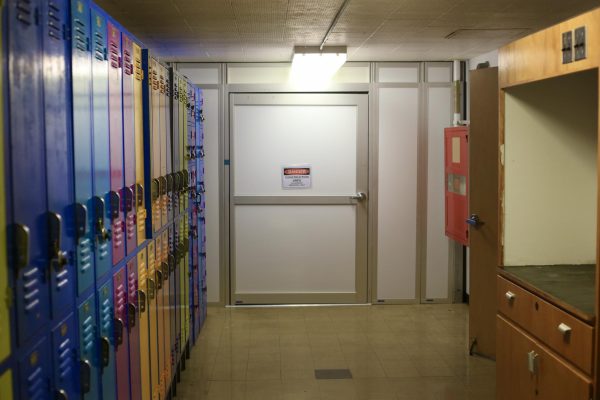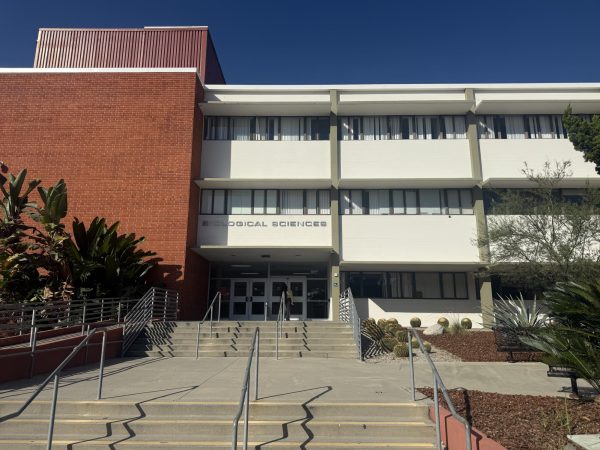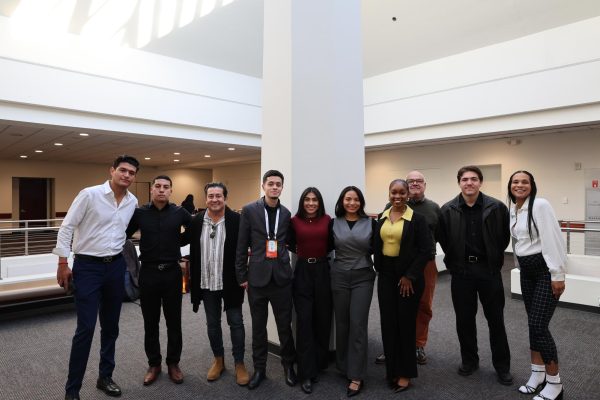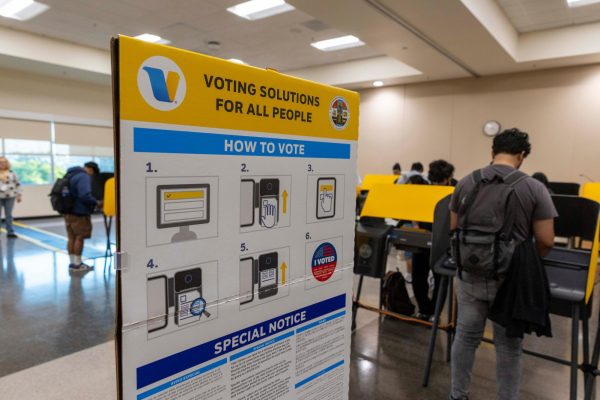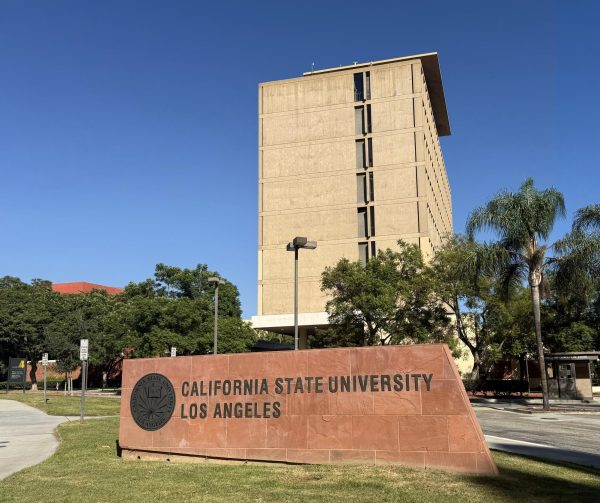CAPS slowly rebuilding after past problems
Cal State LA’s garden of well-being is part of the WellBeingU initiative. Photo by Will Baker.
After many past complaints about Counseling and Psychological Services (CAPS), there have been some major changes that are supposed to improve the care students receive.
Struggles with mental health are very common for college students, according to MayoClinic.org.
“Up to 44% of college students reported having symptoms of depression and anxiety,” according to their website.
Cal State LA President William A. Covino publicly acknowledged the need for mental health resources on campus and established the WellBeingU initiative, formerly known as Mind Matters, in 2014.
Part of that initiative has been the heavy promotion of CAPS around campus. Posters in lecture halls, bulletin boards in the residence halls and even professors’ syllabi all advertise the phone number of CAPS, (323) 343-3300, and encourage students to call it.
However, past University Times (UT) coverage reported that there were long wait times and lack of proper staffing.
As of Spring 2023, CAPS has made some changes, including appointing a new interim director, Dr. Osmara Reyes-Osorio.
CAPS has also hired new counselors and staff, according to Reyes-Osorio.
“Currently, we have seven faculty counselors and seven trainees and one referral specialist and a triage nurse. We also are in the process of hiring a clinical coordinator and other faculty counselors,’’ Reyes-Osorio told the UT.
There is now no longer a waitlist to see a counselor, according to Reyes-Osorio. This is one of the biggest problems CAPS faced, with multiple students interviewed claiming they had to wait weeks to receive help.
Even still, more counselors are likely needed to continue serving Cal State LA’s large student population. As of Fall 2022, there were over 26,000 enrolled students, according to Cal State LA’s website. No data for Spring 2023 enrollment has been uploaded yet.
“The university is addressing the concerns that have been raised regarding the management of CAPS and the delivery of services,” a university spokesperson told the UT. “The goal of CAPS is to assist students with counseling services in a timely manner. The leadership of Student Life and President Covino are deeply committed to supporting the well-being of our students. CAPS continues to provide services in a manner that is consistent with other campuses in the CSU.”
Past problems
Some staff and students said that CAPS did not have enough resources to be able to help students.
During the 2021-2022 school year, CAPS was not able to accommodate many students who needed services, according to a former CAPS counselor, Jennifer Reyes.
Reyes worked at CAPS for seven years before leaving in 2022.
“We had the problem of students wanting services but not being able to receive them,” Reyes said. “Our case loads quickly got full, each counselor had 25 hours of clinical time and could only see a certain number of students. We would get students who would call in but we had to tell them that we were booked and had to turn them away.”
The reason why counselors’ case loads got so overbooked is because CAPS was understaffed, according to Reyes. Understaffing continues to plague CAPS.
In September 2022, there were only six counselors working at CAPS. Since then, that number has only risen to seven, according to the Cal State LA website.
“We have an open and ongoing recruitment process for counselors, but the current mental health crisis across the nation makes it difficult to recruit qualified counselors who will come into the office five days a week to meet with students,” a university spokesperson told the UT. “We insist on this requirement to maintain the excellent quality of services provided to students by CAPS.”
According to both Reyes and Anthony Ratcliff, the president of the California Faculty Association (CFA), the recommended student to counselor ratio is 1:1500. This is recommended by the Association of Counseling Services.
The CFA is a union that represents Cal State LA faculty.
In order to meet that ratio, CAPS would need to employ 16 counselors.
From 2016 until May 2022, the highest number of counselors employed at CAPS has been 11, according to Reyes.
CFA has been advocating for Covino’s administration to address the concerns raised by several CAPS counselors, according to Ratcliff.
One of the biggest reasons why CAPS has such a high turnover is because of Covino’s alleged refusal to hire any counselors on a tenured track, according to Ratcliff.
Covino declined to comment on this matter.
Reyes also claimed this was a large part of CAPS’ struggles with retention.
At most universities, according to both Ratcliff and Reyes, counselors are hired on a tenured track. This means that after a certain number of years working at an institution, their position becomes permanent. This encourages faculty to stay loyal to the institutions they are working at.
But the university claims this is not so unusual.
“Non-tenure track counselors continue to be the norm across the CSU,” a university spokesperson told the UT.
There were also claims of a toxic work environment under the former CAPS director, Dr. April Clay, according to Reyes.
The counselors filed a chapter grievance to faculty affairs in Sept. 2021 and they requested the union rep be present at meetings, according to Reyes. Faculty affairs agreed to this. Immediately after that, Reyes claimed that Clay canceled a lot of events.
“After that, the staff began to feel that Dr. Clay was retaliating against us,” Reyes said. “I was doing workshops with the [Dreamers Resource Center] and without asking, Clay canceled all of my workshops. She then told the staff that all of our events were canceled and from now on, if we had any events we wanted to do, we would have to get her approval first.”
By the end of the academic year of 2022, Reyes claimed that seven therapists, including Reyes, had quit because of Clay.
Clay did not respond for comment, despite multiple attempts from the UT.
In July 2022, Reyes went on to publish an essay on Medium.com, detailing her criticisms of CAPS.
Student experiences
Despite all of the struggles facing CAPS, some students like fourth-year Ashley Aguirre say that the CAPS counselors try to go above and beyond to make a difference in their students’ lives.
“It actually saved my life, the counselor I had helped me in so many ways,” Aguirre said. “I was pretty much almost homeless on the first day of classes and I remember having professors that were strict on having cameras on for Zoom but I was always having to turn mine off while I was dealing with being kicked out of the place I was living at. I had to start a legal process to have some people stay away from me and I didn’t have any of my belongings, including basic necessities for school, like my laptop or even clothes.”
Despite Aguirre’s positive experience with CAPS last year, she has some reservations about going back.
“I hesitate to even reach out because of the news I’ve been seeing surrounding how our school is only providing the whole student body with just a few counselors,” Aguirre said. “It’s simply not right and I wish that our school could see that by offering students this free service, it benefits us in so many ways outside of just our school lives.”
Additional Resources
Reyes sent the UT a list of resources that she would recommend for students who may have gone over the 10 allotted sessions with CAPS.
211 is a locally based, nonprofit guide for LA County with services and information on how to navigate life in Los Angeles.
Students with Medi-Cal can call the LA County Department of Mental Health Access Line for a referral to a clinic: 1-800-854-7771.
Anna Kuchison is a second-year Journalism major and intern reporter at The University Times. In her free time she likes to travel and spend time with her...
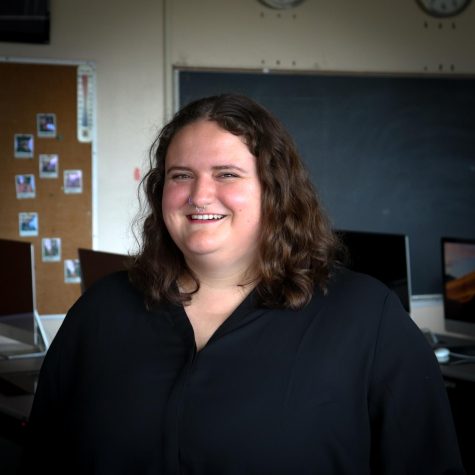
Victoria Ivie (she/they) is a fourth-year journalism major. She is the Editor-in-Chief of the University Times and writes with a focus of undercovered...
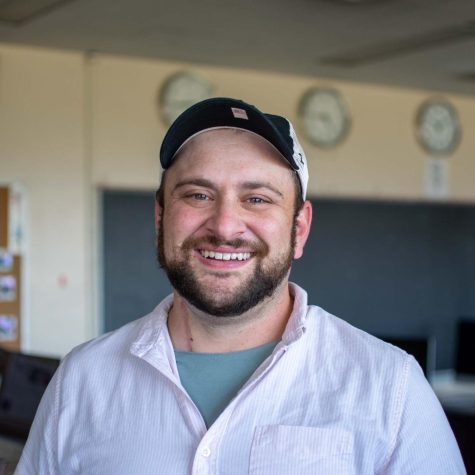
Will Baker is in his final year of undergraduate at Cal State LA studying film production and minoring in entertainment marketing. He is the multimedia...


